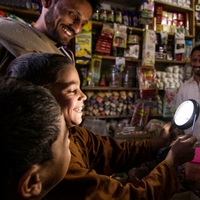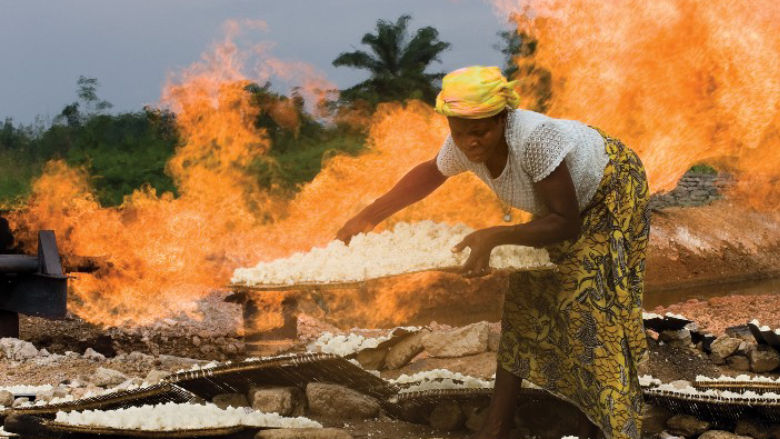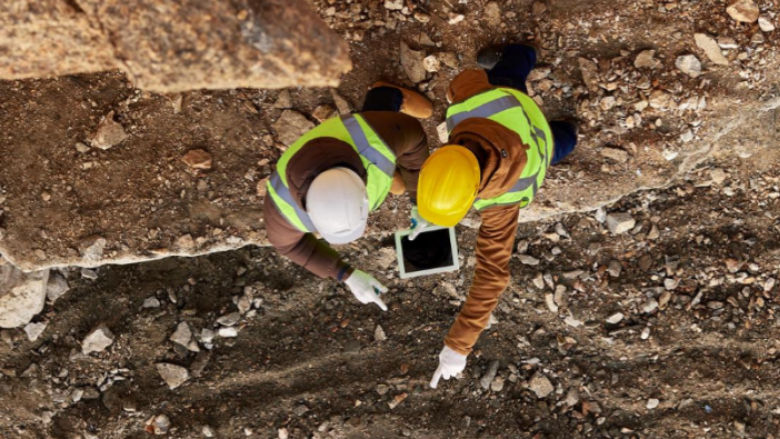There are more options than ever before to supply electricity. The World Bank Group is scaling up its knowledge and financing to deliver faster and provide cost-efficient energy solutions, meeting growing demand while boosting job creation and growth.
Countries have different needs and resources, which is why our approach prioritizes accessibility and affordability, manages emissions responsibly, and embraces the reality that context matters. In many countries, solar and wind now offer the lowest-cost path to electrification. In others, natural gas or hydropower may play a role. As technologies evolve, nuclear offers new opportunities. That’s why we support countries in finding the energy mix that works best for them.
Our work is organized around three areas: getting more out of the grid, expanding supply, and managing emissions responsibly.
Electricity Grids
Strong electricity grids are at the heart of affordable, accessible electricity, which is why it's important to increase investment in transmission and distribution grids. The World Bank Group will expand the use of digital tools, including AI, to modernize grid operations, manage demand more efficiently, and reduce losses. We will also deepen our support for regional power trade and cross-border connections.
Expanding Supply
As countries need new generation capacity to meet rising demand, we will support a full range of technologies: solar, wind, hydropower, geothermal, storage, gas, and, eventually, nuclear.
Managing Emissions Responsibly
The World Bank Group has not financed a new coal-fired power plant since 2010. We advise on and finance the retirement or repurposing of coal plants, supporting carbon capture for industry and power generation. We work with countries to reduce flaring and methane emissions from gas systems, capturing gas that can be used for electricity or industry instead of being wasted. For gas, we will continue to advise on and finance midstream and downstream projects when they represent the least-cost option, align with countries’ Nationally Determined Contributions and national development plans, minimize stranded asset risk, and don’t constrain renewables. We aim to further clarify with our board whether we should pursue upstream gas in exceptional circumstances to boost energy access in the poorest countries.
Nuclear Energy
The World Bank Group is reentering the nuclear energy space. We will advance this work in close partnership with the International Atomic Energy Agency (IAEA)—building capacity and strengthening our ability to advise on non-proliferation safeguards, safety, security, and regulatory frameworks.
Together with the IAEA and other partners, we will support efforts to extend the life of existing reactors in countries, and help support grid upgrades and related infrastructure. We will also work to accelerate the potential of Small Modular Reactors—so they can become a viable option for more countries over time.
Mission 300: A Partnership to Expand Electricity Access to 300 Million People
Mission 300 aims to provide electricity to 300 million people across Africa by 2030. It is led by the World Bank Group and the African Development Bank, with the support of partners. This bold initiative unites governments, the private sector, development institutions, and philanthropies to deliver reliable, affordable power, improve utility efficiency, and attract private investment.
In January 2025, 30 African Heads of State and governments committed to concrete reforms and actions to expand access to reliable and affordable electricity to power economic growth across the continent. By addressing the fundamental challenge of energy access, Mission 300 serves as the cornerstone of our jobs agenda for Africa’s growing youth population and the foundation for future development. Since July 2023, we have connected nearly 21 million people in Africa to electricity, with projects underway to reach nearly 100 million more in the pipeline.
- In Côte d’Ivoire, the Electricity for All program is helping low-income households and communities afford electrical meters, boosting small businesses and quality of life. Our support has facilitated access to power for over 2 million low-income Ivoirian households—double the number of connections since its launch in 2014.
- In Tanzania, energy projects over the past 5 years have connected more than eight million people to electricity and expanded the power grid to nearly 100% of villages nationwide. These achievements have helped Tanzania attain one of Sub-Saharan Africa’s fastest electrification rates.
Scaling Up Off-Grid Solutions
Mission 300 will expand national electricity grids, deploy mini-grids and standalone solar systems where grid expansion isn’t feasible, and deliver electricity to some of the most remote and vulnerable communities.
More than 560 million people benefit from off-grid solar power for their homes, farms, businesses, and public infrastructure. Off-grid solar is set to be the most cost-effective way to provide about half of the electricity access under Mission 300, generating an estimated $5.6 billion in household savings and new income for families and powering two million micro-enterprises. Deploying off-grid solar technologies will create thousands of new jobs and accelerate the growth and impact of an industry already employing over 65,000 people across the continent and supporting a further 62,000 through informal work.
Off-grid companies targeting the world’s poorest communities often bear significant financial risk. Tailored financial interventions—like concessional capital and local currency financing—can reduce this risk and attract new investors. The World Bank Group, African Development Bank, and Mission 300 partners are expanding investment opportunities through platforms like Zafiri, which aims to mobilize up to $1 billion by providing patient equity to companies that advance distributed renewable energy solutions.
- The World Bank Malawi Electricity Access Project has rapidly scaled up affordable electricity access through off-grid solutions for many households far from the national grid. So far, more than 140,000 households have been connected.
Building More Resilient Communities and Vibrant Economies
Access to electricity boosts the resilience of people who are among the most vulnerable to the impacts of climate change, natural disasters, and extreme weather events. In Africa, where more than two-thirds of the post-harvest food supply is lost, electric pumps, new food processing, and conservation equipment help communities increase and preserve their food supply and diversify their incomes, making them less vulnerable to severe floods or droughts. As temperatures rise and heat waves become more frequent, power fans and cooling devices can help prevent heat-related illnesses and deaths and improve labor productivity. Electricity also improves health outcomes for women and girls by powering clean cooking technology that reduces exposure to extreme heat and local air pollution.
Investments in distributed renewable energy (DRE) solutions are often the cheapest and easiest way to enhance the resilience of power systems and connect the most remote populations that previous technologies could not reach. DRE solutions are portable, can be quickly deployed or restored after an extreme weather event, and can serve as backup power during outages. In Nigeria, the DARES project will help over 17 million Nigerians access efficient electricity using distributed renewable energy solutions, replacing over 250,000 polluting and expensive diesel generators. It will address immediate energy needs and strengthen Nigerian communities' long-term resilience by reducing vulnerability to power cuts.
Last Updated: Jun 23, 2025





